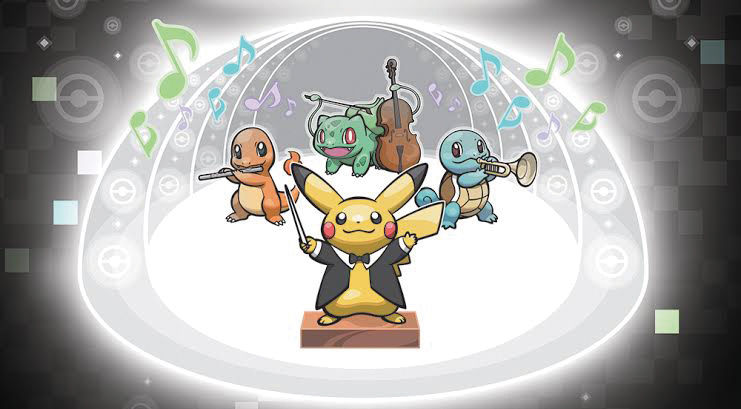Bulbasaur and Beethoven: ‘Pokémon: Symphonic Evolutions’ caught Heinz Hall last Saturday
January 19, 2015
Cosplayers might usually feel out of place at the symphony, but a recent Heinz Hall performance was a costume-appropriate gala.
A Pokémon-themed symphony, starring the Pittsburgh Symphony Orchestra, graced the historic, gilded hall on Saturday, and it was about the most immaculate blend of low and high culture that presently exists. Fans dressed casually for the “Pokémon: Symphonic Evolutions” concert, forgoeing black tie attire for Pikachu suits, Team Rocket shirts, Ash Ketchum costumes, Misty suspenders and many, many hats.
“Symphonic Evolutions,” conducted by Susie Benchasil Seiter and composed and arranged by Chad Seiter — the same couple who developed “The Legend of Zelda: Symphony of the Goddesses” — premiered in Washington, D.C., last August. It concluded the 2014 Pokémon World Championships, which is an annual event that crowns the top players in both the trading card game and video games.
“Pokémon: Symphonic Evolutions” was a success in D.C., and it continued to please in Pittsburgh, where an overture of the video game’s title screen theme — a racking, rousing and get-up-and-go-adventure compilement — evoked innumerable gasps and ahhs and brought tears to the audience’s eyes. The title screens of all six generations of video games flashed across the screen above the orchestra, literally setting the stage for the mixture of music and visuals to come.
Afterward, Seiter stepped off her podium and exclaimed, “Pittsburgh, I choose you!,” and threw a stuffed Pikachu toy to a lucky trainer seated orchestra-center.
Then, the symphony dove into the heart of Pokémon and its origins of “Red,” “Blue” and “Yellow” games with the lovable tones of “Pallet Town.” Scenes culled from the games were projected above the orchestra, including the main player-character Red’s first encounter with Professor Oak, the wise scientist and mentor figure who bequeaths the Pokédex, and spurrs Red’s most permanent and colossal choice: Charmander, Bulbasaur or Squirtle?
The crowd roared in dissatisfaction when Red chose Charmander, as the communal favorite — denoted by cheers when it was highlighted — clearly appeared to be Bulbasaur.
From the idyllic “Pallet Town,” the narrative and musical arc moved to the notoriously villainous Team Rocket with “Prepare for Trouble,” a title garnering much excitement from the audience for its reference to the bombastically ineffectual trio from the 1997 anime series. This title in particular is why orchestras need to revive scores from yesteryear, as orchestra sound is precisely how the tinny Game Boy Sound System should be heard and remembered.
“Prepare for Trouble” debuted Red’s assault against Team Rocket’s secret headquarters and his first battle against the boss, Giovanni. The orchestra’s percussion section, particularly the razor-edged snare drum, carried the onslaught from the projections into the seats. The massive string section channeled their bows furiously, urgently sawing in the stakes of Red’s battle and ultimately cranking the volume up to 11. Red’s plight felt real, and a sigh emanated throughout the hall upon the defeat of Giovanni’s Persian.
From then on, the program settled into a pattern of three arrangements per generation (or grouping) of Pokémon games.
Highlights included “…” from Generation II, an assault of a score that was visceral and frightening to the core, boasting a huge swell into a dark and heavy key of the “Pokémon Main Theme” as Ethan scaled Mt. Silver to confront Red. Generation III’s “Falling Ashes,” Mt. Chimney’s powerful and uplifting theme, was another high point in which Brendan challenges Team Aqua and thwarts its plans to artificially raise ocean levels. It sobered up the concert’s tone a bit, considering Generation III’s recognition of the climate change problems plaguing the world preesently.
The intermezzo detailed a delightfully airy arrangement of the Pokémon Center theme played almost entirely on bells and marimbas, but the truly memorable episode arrived at the show’s false ending. After supposedly concluding with “Friends, Fights and Finales” from Generation VI, the symphony revealed that it had two more songs to play that required audience interaction.
When the familiar trills of “Gotta Catch ‘Em All” erupted from the stage, the concertgoers detonated in their seats. Almost everybody sang along, and the applause that followed seemed endless.
Most importantly, the concert’s attendees didn’t skew in any category, and there was a thorough mix of all kinds of people. Presumably there were a lot more photo-ops than at your usual symphony — surely not nearly as many people arrive in costume — and this is exactly why video game scores need to enter the mainstream. They bring people together in ways that other media can’t.



